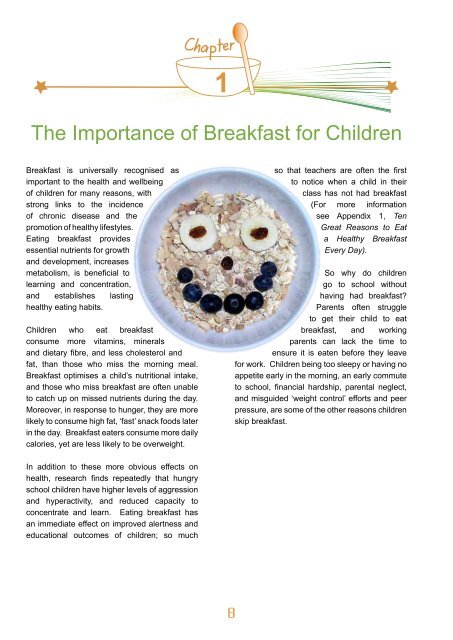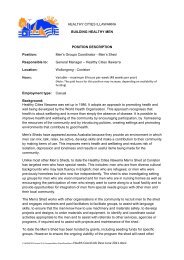here - Healthy Cities Illawarra
here - Healthy Cities Illawarra
here - Healthy Cities Illawarra
Create successful ePaper yourself
Turn your PDF publications into a flip-book with our unique Google optimized e-Paper software.
Chapter<br />
1<br />
The Importance of Breakfast for Children<br />
Breakfast is universally recognised as<br />
important to the health and wellbeing<br />
of children for many reasons, with<br />
strong links to the incidence<br />
of chronic disease and the<br />
promotion of healthy lifestyles.<br />
Eating breakfast provides<br />
essential nutrients for growth<br />
and development, increases<br />
metabolism, is beneficial to<br />
learning and concentration,<br />
and establishes lasting<br />
healthy eating habits.<br />
Children who eat breakfast<br />
consume more vitamins, minerals<br />
and dietary fibre, and less cholesterol and<br />
fat, than those who miss the morning meal.<br />
Breakfast optimises a child’s nutritional intake,<br />
and those who miss breakfast are often unable<br />
to catch up on missed nutrients during the day.<br />
Moreover, in response to hunger, they are more<br />
likely to consume high fat, ‘fast’ snack foods later<br />
in the day. Breakfast eaters consume more daily<br />
calories, yet are less likely to be overweight.<br />
so that teachers are often the first<br />
to notice when a child in their<br />
class has not had breakfast<br />
(For more information<br />
see Appendix 1, Ten<br />
Great Reasons to Eat<br />
a <strong>Healthy</strong> Breakfast<br />
Every Day).<br />
So why do children<br />
go to school without<br />
having had breakfast?<br />
Parents often struggle<br />
to get their child to eat<br />
breakfast, and working<br />
parents can lack the time to<br />
ensure it is eaten before they leave<br />
for work. Children being too sleepy or having no<br />
appetite early in the morning, an early commute<br />
to school, financial hardship, parental neglect,<br />
and misguided ‘weight control’ efforts and peer<br />
pressure, are some of the other reasons children<br />
skip breakfast.<br />
In addition to these more obvious effects on<br />
health, research finds repeatedly that hungry<br />
school children have higher levels of aggression<br />
and hyperactivity, and reduced capacity to<br />
concentrate and learn. Eating breakfast has<br />
an immediate effect on improved alertness and<br />
educational outcomes of children; so much<br />
8













